Fleurs du Mal Magazine


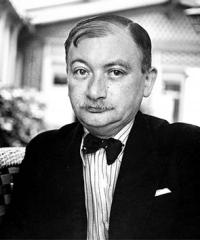
Nervenschock
Seht her: In einem Zauberknäul gebannt
schlottert und taumelt er an schwanker Krücke,
bald hart am Pflasterrand und bald zurück
prallt klappernd sein Gebein an rauher Wand.
Und aller Augen sind ihm zugewandt:
der frechen Neugier und des Mitleids Blick – –
ein Kind, das spielt, hält mitten still im Glücke,
als blick’ es plötzlich in ein dunkles Land . . .
Oh, seht ihn an! In graues Tuch gewandet,
der Menscheit Heldentum in torkelndem Zick-Zack
zwei Kreuzchen scheppern und zwei Bänder
fliegen – – –
Im roten Meer von Blut und Siegen
ist des Jahrhunderts stolzes Schiff gestrandet –
und das ist Euer Wrack! . . .
Joseph Roth
(1894 – 1939)
Nervenschock
Prager Tagblatt – 6.10.1918
• fleursdumal.nl magazine
More in: Archive Q-R, Archive Q-R, Joseph Roth
The Golden Horde is a definitive work on the Italian revolutionary movements of the 1960s and ’70s.
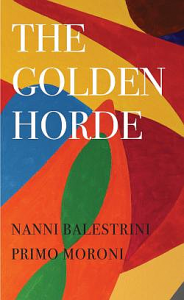 An anthology of texts and fragments woven together with an original commentary, the volume widens our understanding of the full complexity and richness of this period of radical thought and practice.
An anthology of texts and fragments woven together with an original commentary, the volume widens our understanding of the full complexity and richness of this period of radical thought and practice.
The book covers the generational turbulence of Italy’s postwar period, the transformations of Italian capitalism, the new analyses by worker-focused intellectuals, the student movement of 1968, the Hot Autumn of 1969, the extra-parliamentary groups of the early 1970s, the Red Brigades, the formation of a radical women’s movement, the development of Autonomia, and the build-up to the watershed moment of the spontaneous political movement of 1977.
Far from being merely a handbook of political history, The Golden Horde also sheds light on two decades of Italian culture, including the newspapers, songs, journals, festivals, comics, and philosophy that these movements produced.
The book features writings by Sergio Bologna, Umberto Eco, Elvio Fachinelli, Lea Melandri, Danilo Montaldi, Toni Negri, Raniero Panzieri, Franco Piperno, Rossana Rossanda, Paolo Virno, and others, as well as an in-depth introduction by translator Richard Braude outlining the work’s composition and development.
Nanni Balestrini (1935–2019) was an Italian poet, experimental writer, visual artist and founding member of both the avant-garde Gruppo ’63 and the revolutionary organization Potere Operio.
Primo Moroni (1936–1998) was an Italian writer, activist and archivist. Founder of the Calusca bookshop in Milan, for decades he was a point of reference for radical movements and subcultures across Italy.
Richard Braude lives in Palermo, Italy. His translations include works by Nanni Balestrini, Mariarosa Dalla Costa, Antonio Negri and Rossana Rossanda.
The Golden Horde
Revolutionary Italy, 1960–1977
by Nanni Balestrini and Primo Moroni
Translated by Richard Braude
ISBN: 9780857427465
Pages: 690
Publication Year: May 2021
Size: 6″ x 9″
Format: Hardback
Publisher: Seagull Books
£35
• fleursdumal.nl magazine
More in: #Editors Choice Archiv, #Modern Poetry Archive, - Book News, Archive A-B, Archive M-N, Art & Literature News
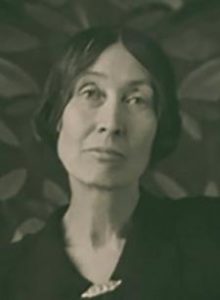
The Star
Last night
I watched a star fall like a great pearl into the sea,
Till my ego expanding encompassed sea and star,
Containing both as in a trembling cup.
Lola Ridge
(1873-1941)
The Star
• fleursdumal.nl magazine
More in: Archive Q-R, Archive Q-R, Ridge, Lola
Geluksvogels bevat een keuze uit Luigi Pirandello’s Novellen voor een jaar, in een blinkend nieuwe vertaling van Yond Boeke en Patty Krone.
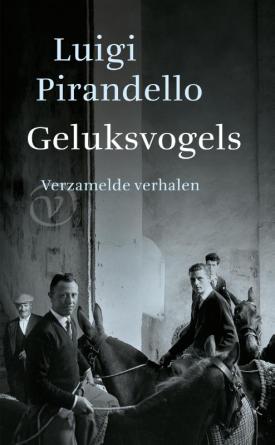 Pirandello schreef deze opmerkelijk hoogwaardige verzameling verhalen tussen 1894 en 1936. Zijn dood belette hem het project – één novelle voor elke dag van het jaar – te voltooien.
Pirandello schreef deze opmerkelijk hoogwaardige verzameling verhalen tussen 1894 en 1936. Zijn dood belette hem het project – één novelle voor elke dag van het jaar – te voltooien.
De diversiteit van zijn verhalen, die getuigen van groot psychologisch inzicht, een buitengewoon scherp gevoel voor humor en immens mededogen, is exemplarisch voor Pirandello’s enorme veelzijdigheid als schrijver.
Hij voert een breed scala aan markante personages ten tonele: van arme Siciliaanse boeren die tevergeefs strijden tegen de clerus tot wufte stedelingen die verstrikt raken in hun eigen overspel, van een wanhopige patiënt die in een New Yorks ziekenhuis uit het raam springt tot een geëxalteerde actrice die het moet opnemen tegen een vleermuis.
Pirandello laveert virtuoos tussen vlotte dialogen, van weemoed doortrokken landschapsbeschrijvingen en filosofische bespiegelingen over het aardse bestaan. Sommige verhalen blijken ook nu nog verrassend actueel.
Luigi Pirandello (1867-1936), geboren in een gegoede familie op Sicilië, kreeg in 1934 de Nobelprijs voor de Literatuur. De verfilming van zijn verhalen door Paolo en Vittorio Taviani, Kaos, werd wereldberoemd.
Geluksvogels
Novellen
Door Luigi Pirandello
Uitgeverij Van Oorschot
2022
Gebonden
832 pagina’s
ISBN 9789028213142
Prijs: € 45,00
• fleursdumal.nl magazine
More in: - Book News, Archive O-P, Luigi Pirandello, Pirandello, Luigi
To create the poems in this collection, Nobel Prize–winner Herta Müller cut up countless newspapers and magazines in search of striking phrases, words, or even fragments of words, which she then arranged in a the form of a collage.
 Father’s on the Phone with the Flies presents 73 of Müller’s collage poems for the first time in English translation, alongside full-colour reproductions of the originals.
Father’s on the Phone with the Flies presents 73 of Müller’s collage poems for the first time in English translation, alongside full-colour reproductions of the originals.
Müller takes full advantage of the collage form, generating poems rich in wordplay, ambiguity and startling, surreal metaphors—the disruption and dislocation at their core rendered visible through stark contrasts in colour, font and type size.
Liberating words from conformity and coercion, Müller renders them fresh and invests them forcefully with personal experience.
Herta Müller was born in a German-speaking community in western Romania in 1953. She published her first collection of short stories in 1982. In 1987, she left Romania for West Berlin, where she continued to write and publish. She has been awarded numerous prizes, including the 2009 Nobel Prize for Literature.
Herta Müller
Father’s on the Phone with the Flies
A Selection
Translated by Thomas Cooper
ISBN: 9781803090450
Pages: 200 pages
73 colour plates
Publication Year: 2022
Format: Paperback
Size: 5 x 8
Rights: UCP
Series: The Seagull Library of German Literature
Category: Poetry
£11.99
• fleursdumal.nl magazine
More in: #Editors Choice Archiv, *Concrete + Visual Poetry P-T, - Book News, Archive M-N, Archive M-N, Awards & Prizes
To live in an Alaska of the mind is to map the imagined cartography of winter on all that is physical.
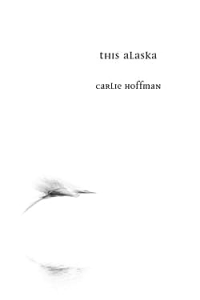
To dwell perpetually in a symbolic cold, and to emerge, with grace, unscathed. This book questions what it means to live and love in such a buried season.
This Alaska interrogates all that emotional and physical intimacy cannot salvage or keep warm. Death and dreams are at the very center of this book. But life — and all it entails and circles and loses and loves — is at its heart.
Carlie Hoffman is a poet and translator from New Jersey. Her honors include a 92Y Discovery Prize and a Poets & Writers Amy Award. She is the founder and editor-in-chief of Small Orange Journal. This Alaska is her first book. She lives in New York City.
This Alaska
by Carlie Hoffman
Publisher: Four Way Books
15 september 2021
Poetry
English
Paperback
76 pages
ISBN-10: 1945588926
ISBN-13: 978-1945588921
€ 21,36
• fleursdumal.nl magazine
More in: #Editors Choice Archiv, - Book News, Archive G-H, Archive G-H
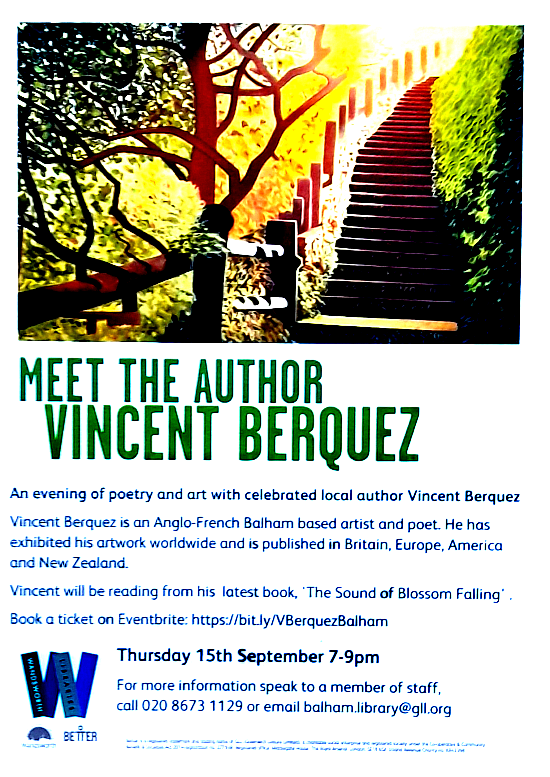
More in: Archive A-B, Berquez, Vincent, Literary Events, Vincent Berquez

An evening of poetry and art with celebrated local author Vincent Berquez.
Vincent Berquez is an Anglo-French Balham based artist and poet. He has exhibited his artwork worldwide and is published in Britain, Europe, America and New Zealand.
Vincent will be reading from his latest book, ‘The Sound of Blossom Falling’.
Thu, 15 September 2022
19:00 – 21:00 BST
Location
Balham Library
16 Ramsden Road
London
SW12 8QY
United Kingdom
more information on website:
https://allevents.in/london/meet-author-and-artist-vincent-berquez/10000394228948397
• fleursdumal.nl magazine
More in: #Editors Choice Archiv, - Book Lovers, Archive A-B, Archive A-B, Berquez, Vincent, FDM in London, Literary Events, Vincent Berquez
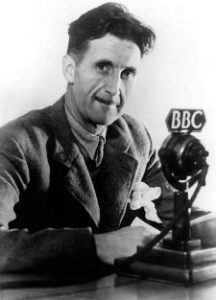
Awake! Young Men of England
OH! give me the strength of the Lion,
The wisdom of reynard the Fox
And then I’ll hurl troops at the Germans
And give them the hardest of knocks.
Oh! think of the War Lord’s mailed fist,
That is striking at England today:
And think of the lives that our soldiers
Are fearlessly throwing away.
Awake! Oh you young men of England,
For if, when your Country’s in need,
You do not enlist by the thousand,
You truly are cowards indeed.
George Orwell
(1903 – 1950)
Awake! Young Men of England
• fleursdumal.nl magazine
More in: Archive O-P, Archive O-P, George Orwell, Orwell, George
Widely considered to be among the most important Italian poets of the twentieth century, Sandro Penna was born and raised in Perugia but spent most of his life in Rome.
 Openly gay, Penna wrote verses celebrating homosexual love with lyrical elegance.
Openly gay, Penna wrote verses celebrating homosexual love with lyrical elegance.
His writing alternates between whimsy and melancholia, but it is always full of light.
Juggling traditional Italian prosody and subject matter with their gritty urban opposites in taut, highly concentrated poems, Penna’s lyrics revel in love and the eruption of Eros together with the extraordinary that can be found within simple everyday life.
There is something ancient in Penna’s poetry, and something Etruscan or Greek about the poems, though the landscape is most often of Rome: sensual yet severe, sinuous yet solid, inscrutable, intangible and languorous, with a Sphinx-like and sun-soaked smile.
Penna’s city is eternal—a mythically decadent Rome that brings to mind Paris or Alexandria. And though the echoes resound—from Rimbaud, Verlaine, Baudelaire to Leopardi, D’Annunzio, Cavafy—the voice is always undeniably and wonderfully Penna’s own.
Sandro Penna (1906–77) was an Italian poet. During his life, he was awarded two of Italy’s most important literary awards, the Premio Viareggio and the Premio Bagutta. His work has been translated into many languages, including English, French, German, Japanese, and Spanish, and has appeared in numerous anthologies of Italian poetry.
Alexander Booth is a writer and translator and the recipient of a 2012 PEN Translation Fund grant for his translations of Lutz Seiler.
Sandro Penna
Within the Sweet Noise of Life
Selected Poems
Translated by Alexander Booth
ISBN: 9780857427878
Format: Hardback
Pages: 96
Rights: UCP
Publication Year: March 2021
Size: 5″ x 8.5″
Publisher: Seagull Books
$19.00
• fleursdumal.nl magazine
More in: #Editors Choice Archiv, - Book News, Archive O-P, Archive O-P, LGBT+ (lhbt+)
The definitive edition of selected work from a poet whose influence continues to be widely felt today, introduced by Natasha Trethewey
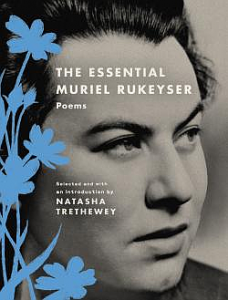 Engaging closely with the violence, oppression, and injustice that she witnessed in her lifetime, Muriel Rukeyser was one of the seminal poets of the mid-twentieth century.
Engaging closely with the violence, oppression, and injustice that she witnessed in her lifetime, Muriel Rukeyser was one of the seminal poets of the mid-twentieth century.
Closely informed by issues relating to equality, social justice, feminism, and Judaism, her impassioned poetry was often seen as a mode of social protest, but it was also heralded for its deep emotional impact; its personal perspective; forthright discussion of the female experience, particularly sex and single parenthood at a time when these topics were largely taboo; and its wide-ranging exploration of genre and form.
As Adrienne Rich wrote: “Muriel Rukeyser’s poetry is unequalled in the twentieth-century United States…She pushes us…to enlarge our sense of what poetry is about in the world, and of the place of feelings and memory in politics.”
The Essential Muriel Rukeyser represents the curation of Rukeyser’s most enduring and urgent work, gathered in one volume that spans the many decades of her life and career, and with an introduction from Natasha Trethewey, one of our most important contemporary poets.
‘This posthumous collection affirms Rukeyser’s importance as a poet of witness.’ — New York Times
The Essential Muriel Rukeyser
Poems
By Muriel Rukeyser
Foreword by Natasha Trethewey
ISBN: 9780062985491
ISBN 10: 0062985493
Imprint: Ecco
2021
Trimsize: 6x7in
Pages: 224 pages
$16.99
• fleursdumal.nl magazine
More in: #Editors Choice Archiv, - Book News, Archive Q-R, Archive Q-R
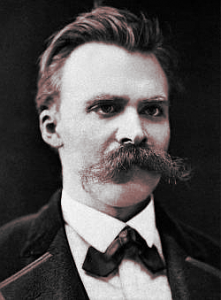
Dem unbekannten Gott
Noch einmal, eh ich weiterziehe
Und meine Blicke vorwärts sende,
Heb’ ich vereinsamt meine Hände
Zu dir empor, zu dem ich fliehe,
Dem ich in tiefster Herzenstiefe
Altäre feierlich geweiht,
Daß allezeit
Mich deine Stimme wieder riefe.
Darauf erglüht tiefeingeschrieben
Das Wort: dem unbekannten Gotte.
Sein bin ich, ob ich in der Frevler Rotte
Auch bis zur Stunde bin geblieben:
Sein bin ich – und ich fühl’ die Schlingen,
Die mich im Kampf darniederziehn
Und, mag ich fliehn,
Mich doch zu seinem Dienste zwingen.
Ich will dich kennen, Unbekannter,
Du tief in meine Seele Greifender,
Mein Leben wie ein Sturm Durchschweifender,
Du Unfaßbarer, mir Verwandter!
Ich will dich kennen, selbst dir dienen.
Friedrich Nietzsche
(1844 – 1900)
Dem unbekannten Gott
• fleursdumal.nl magazine
More in: #Editors Choice Archiv, Archive M-N, Archive M-N, Friedrich Nietzsche, Nietzsche
Thank you for reading Fleurs du Mal - magazine for art & literature